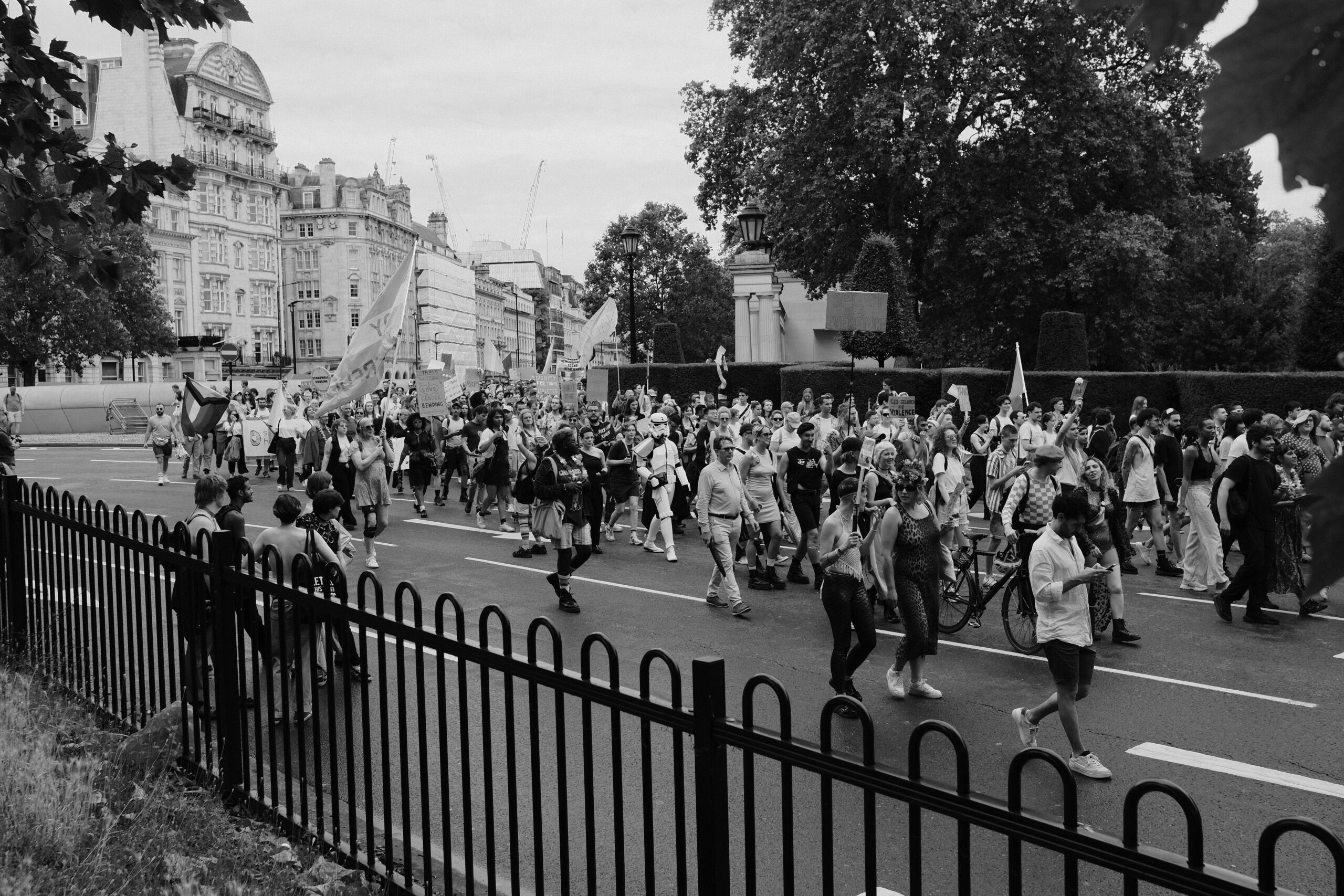This article was written by a member of Black Flag Sydney who was at London Trans+ Pride.
On Saturday, 8 July, around 40,000 protesters gathered at Trafalgar Square, London, for London Trans+ Pride. The afternoon rain deterred nobody as a growing sea of umbrellas populated the area, gathering for what would be the largest Trans rights march in history.
London Trans+ Pride is held by a grassroots community organisation of the same name who is committed to preserving the radical roots of pride, asserting that ‘the London Trans+ Pride march is a protest.’ They call for ‘equality via positive legislative change and radical improvement to our education and public healthcare system to recognise and support the needs of trans people.’
Though the rally didn’t seem to have official demands, protesters and speakers sent a clear and radical political message. The rally was staunchly anti-cop, pro-abolition, emphatically countering targeted Tory policies and TERF rhetoric. Members of the community showed up to the march equally as willing to maintain energy and assert a strong political line as the organisers were. In moments of relative silence—megaphones appeared to be scarce in a crowd of that size—it was the community that would elect to lead chants without them.
The unprecedented turnout may have in part boiled down to the high political tensions for trans people in the UK right now: in January, the Tory Government blocked Scotland’s Gender Recognition Reform Bill by enforcing a certain section of the Scotland Act for the first time in history. This bill would have made it significantly easier for trans and gender-diverse people in the UK to acquire a gender recognition certificate necessary for changing the gender marker on their legal identity documents. Targeted attacks of this kind by British conservatives are seemingly emboldening ‘gender critical’ fanatics and trans exclusionary hate speech spouted by the likes of Kellie-Jay Keen and Julia Long.
Apart from these culture wars, British queer people are falling victim to healthcare disparities: access to NHS gender-affirming care is hard to come by in the UK, with some people reporting waiting years before being allowed access to hormones. As a result, trans and gender-diverse people are forced to illegally source medication themselves or leave the UK. A gender recognition certificate for self-identification can only be issued after an appointment with a ‘gender specialist’ (barred behind these gruelling wait times) and a psychiatrist.
This is during a housing and cost-of-living crisis that, in London as in Sydney, disproportionately affects queer people. The resulting rage from the community was consistently felt throughout the two-kilometre-long march to The Green Park. Across one and a half hours, the energy never waned. Thousands chanted, ‘Bottoms, tops, we all hate cops!’ and ‘trans people say abolition, no pride in cops, no pride in prisons!’ as we passed Piccadilly Circus and rain clouds parted for the sun.
Taking part in a rally so large and expressive was galvanising in itself. Ties to the Black Lives Matter movement were frequently made with placards. Pride was embodied by protesters who marched hand-in-hand, or shirtless, wearing scrubs, or full drag. London Trans+ Pride demonstrated the potential for community solidarity in defence of trans rights, and the capacity for young queer people to consciously counter the bigoted forces that try to stifle them.
A slate of ten speakers spoke from the Wellington Arch in The Green Park after a seemingly endless stream of protestors flooded onto the grass. The feeling at the end of the march was celebratory. The energy garnered by the march remained long after it was over.
British and Australian queers alike feel the effects of culture wars, of healthcare and housing disparity, of a Pride movement backed by large corporations and alienated from the community, and of a government often unwilling to instigate legislative change. London Trans+ Pride this year was the largest in history, but as queer activists and anarchists in Sydney it is up to us to incite struggle in the hopes of building a radical movement for queer liberation to this scale and beyond.
